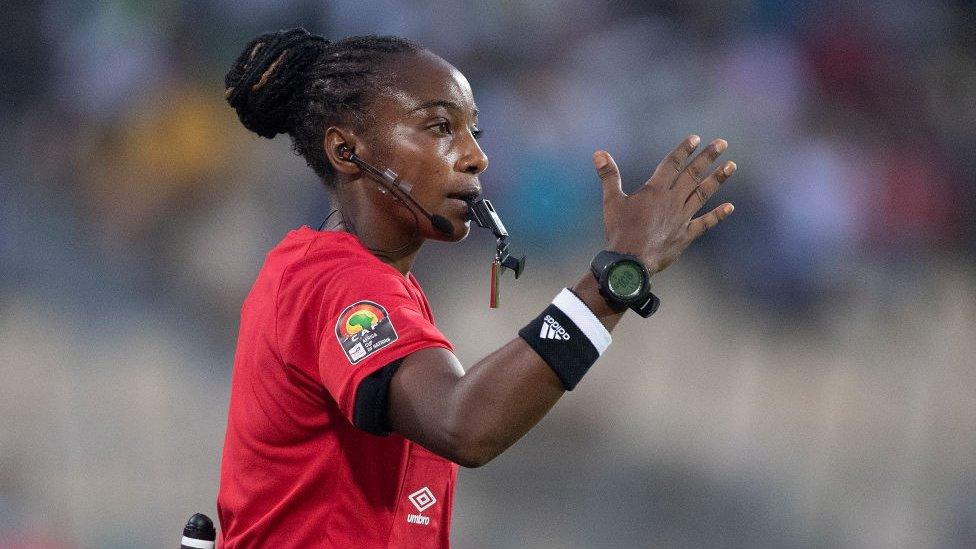World Cup 2022: Female referees in Qatar 'will open doors'
- Published
- comments

Salima Mukansanga in action, she became the first woman to referee a match at the finals of the Africa Cup of Nations
There are a lot of questions and controversy hanging over this World Cup in Qatar.
But one thing that is being widely celebrated is the inclusion of six female officials at the tournament this winter.
Three referees and three assistants will officiate at the men's tournament for the first time.
And leading the way is Rwanda's Salima Mukansanga - hoping to 'open doors' for female officials in the game.
'It is quality that counts for us and not gender'
Mukansanga has already refereed at this year's Africa Cup of Nations and will be accompanied by fellow referees Stephanie Frappart and Yoshimi Yamashita.
"It's an honour and a privilege because it's never happened before," Mukansanga told Â鶹ԼÅÄ Sport Africa.
"It means you're going to be the first one and going to open the door for other women, especially in Africa."
They deserve to be at the World Cup because they constantly perform at a really high level.
We don't yet know which fixtures these three pioneers will take charge of but Mukansanga says they will "all work together for the success of women".
Their appointment at this tournament has come following a long process, but Pierluigi Collina, the chairman of Fifa's referees committee said: "It is quality that counts for us and not gender.
"I hope that in future, the selection of elite women's match officials for important men's competitions will be perceived as something normal."
Challenges facing female referees
Officiating in men's elite tournaments is not without its challenges and Mukansanga has explained previously the problems she has faced.
There will be some people that think women shouldn't referee at the men's level and Mukansanga says there have "been barriers, obstacles and challenges".
But she has embraced those challenges and admits while she may not be as quick as the men on the field, she has worked hard "to at least be on the same pace... and (have) a good angle of vision".
And sometimes it just comes down to biology.
"We have our period - so sometimes you can't be able to run or officiate," she explained.
She also says that when a women gives birth they need more time to recover and prepare the body again before continuing the journey.
Female refereeing training sessions and fitness tests are run alongside the men so there is no special treatment, and she says "in a field dominated by men, you need to double your work - then have the passion".
Mukansanga is no stranger to officiating at men's games and as well as the Africa Cup of Nations she has taken charge of men's league games in Rwanda, the 2016 Women's Nations Cup, the 2019 Women's World Cup and the Tokyo Olympics.
Her journey has not been an easy one but this tournament could provide the platform for more female officials in men's elite competition in the future.
There are currently three female assistant referees in the Premier League.
The English Football League appointed its first female referee in 2021, Rebecca Welch, who has been officiated in men's games in the lower divisions.
- Published18 November 2022
- Published31 March 2021
- Published27 August 2020
